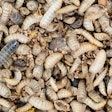Over time, dogs have evolved from their wolf ancestors to be able consume and digest the starches in varied petfood diets found today, according to a new study conducted by scientists in Sweden.
Evolutionary geneticist, Erik Axelsson, Uppsala University, compared the DNA of dogs and wolves to determine which genes were important for domestication. The researchers looked at DNA from 12 wolves worldwide and from 60 dogs belonging to 14 breeds.
Researchers first looked at individual letters, or bases, in DNA that vary from genome to genome, identifying 4 million single-nucleotide polymorphisms. They focused on regions with little or no SNPs, as these regions' lack of variation means the DNA was necessary for survival during domestication, resulting in a loss of variation and the same SNPs for most dogs. The study found 122 genes in 36 regions that contributed to the evolution of dogs, including 10 genes that are important to dogs' ability to digest starch.
According to the research, dogs have four to 30 copies of the gene for the protein amylase, which starts starch breakdown in the intestine, whereas wolves have just one copy on each of their two chromosomes. Another difference noted was that the gene was more active in dogs by 28-fold. These differences mean that dogs should be better than wolves at digesting starches, such as wheat and rice, often found in commercial petfood diets.
Axelsson noted that the number of copies of the gene for amylase also varies in people, depending on the world region and the amount of starch that makes up their diet. " We have adapted in a very similar way to the dramatic changes that happened when agriculture was developed," Axelsson said.
Another key enzyme in starch digestion is the gene that codes for maltase, MGAM, which was found to have the same number of copies in dogs and wolves. However, four differences were observed in the sequence in dogs and wolves, one of which causes dogs to produce longer versions of maltase often seen in other herbivores. Researchers found that these differences make the maltase produced by dogs more efficient than that of wolves, also helping to explain dogs' ability to better digest starches in their diet than wolves.
















